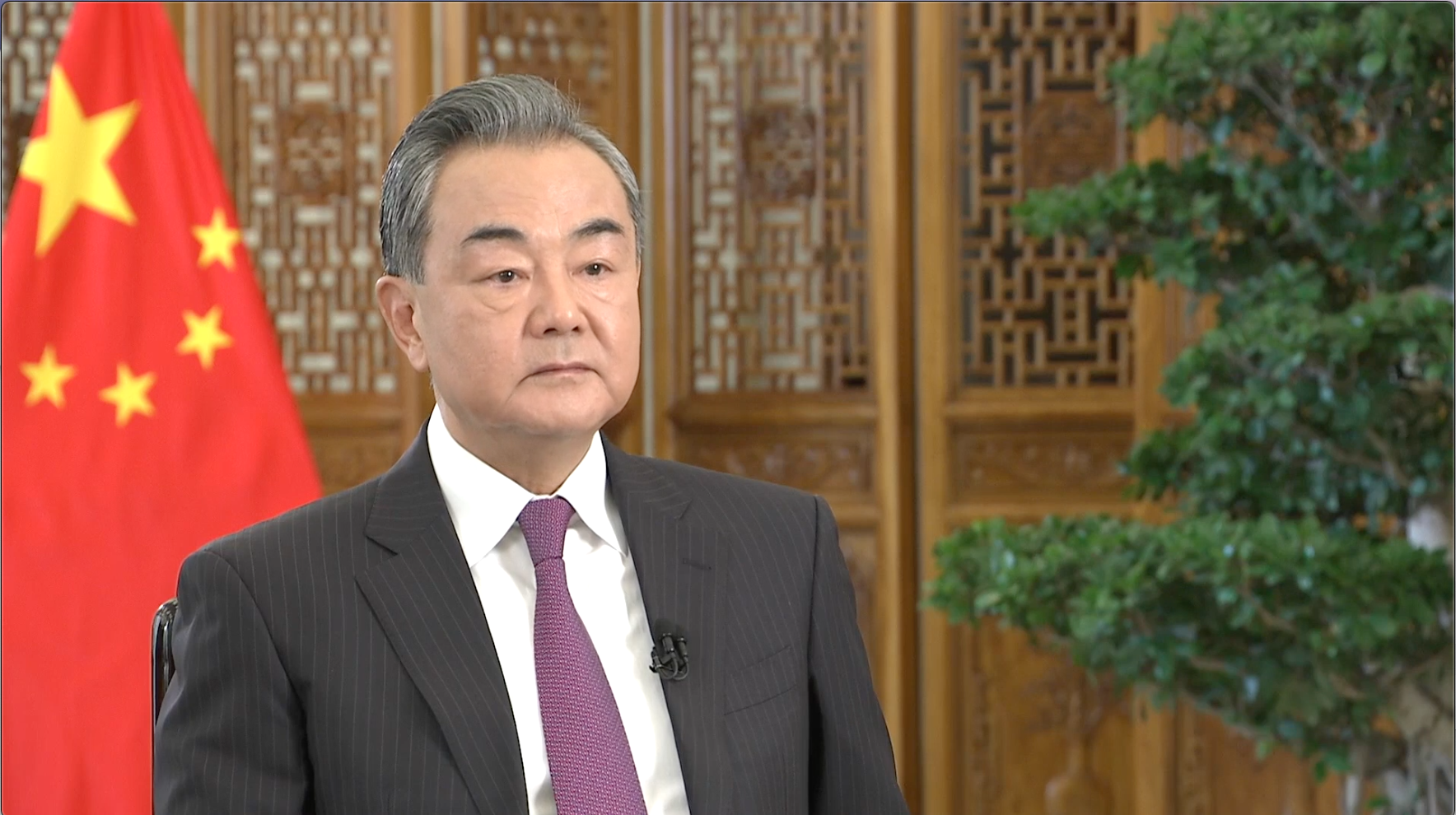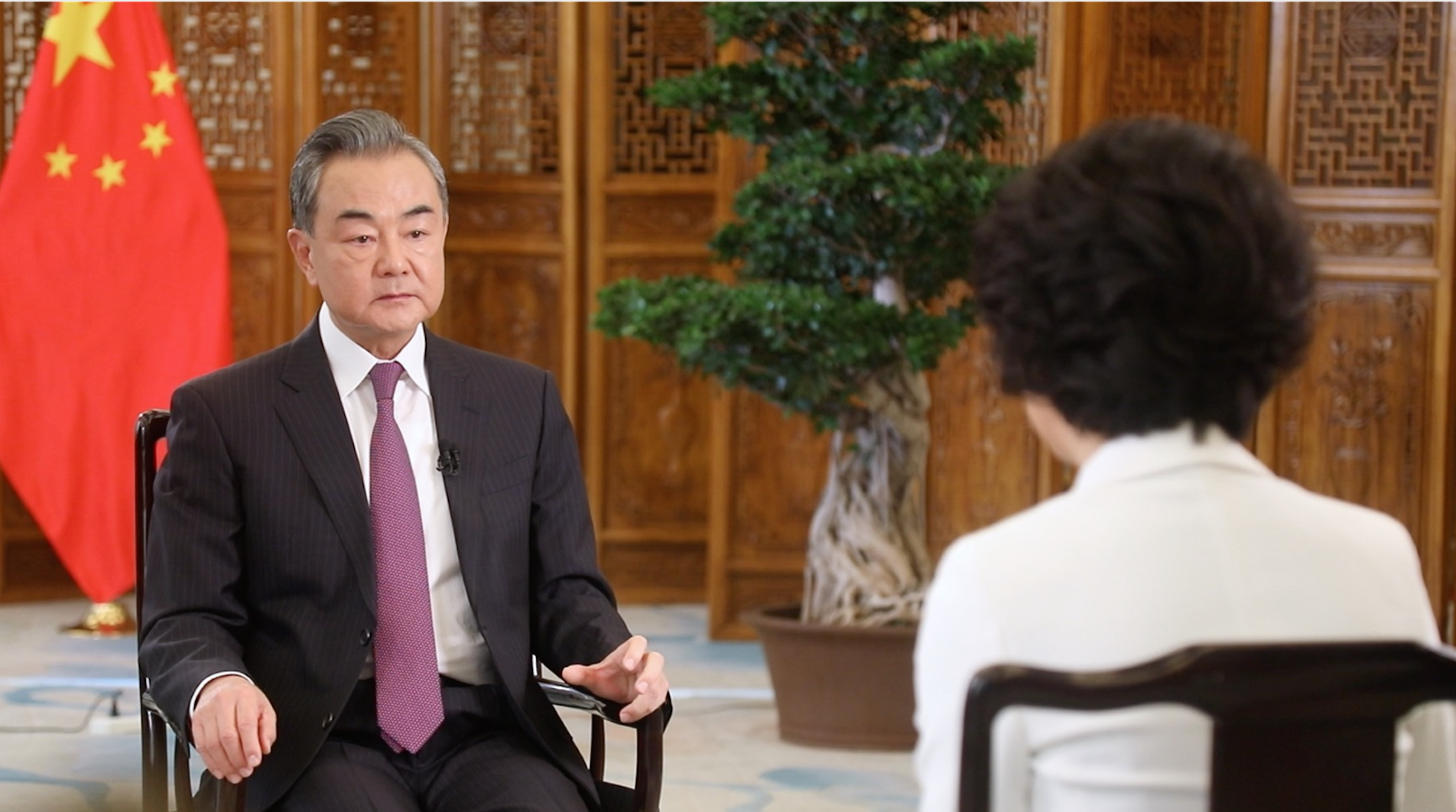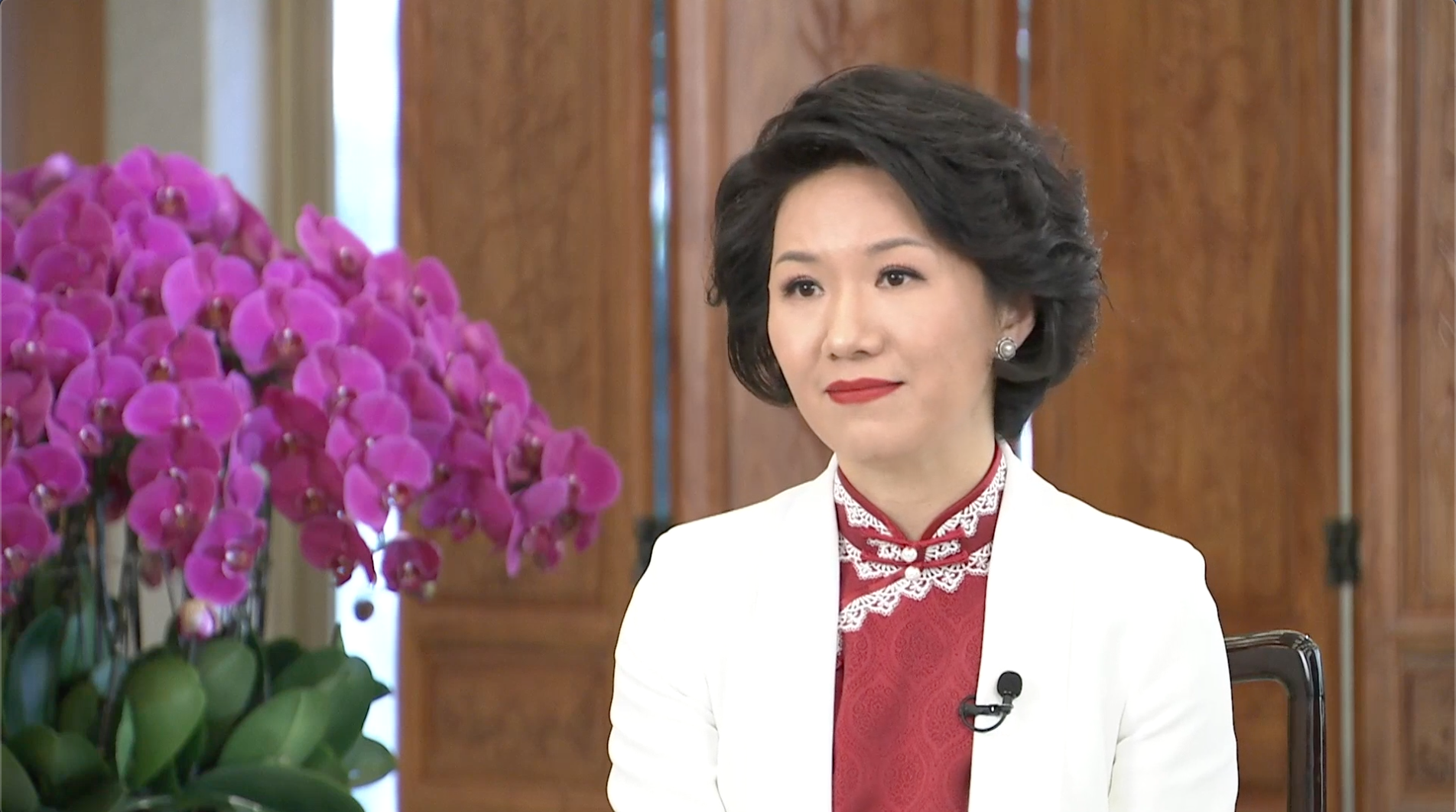03:05

Liu Xin: The year 2021 marks the 20th anniversary of the signing of the Treaty of Good-neighborliness and Friendly Cooperation Between China and Russia. What does it mean for global strategic stability and development when China and Russia shoulder and carry out their responsibilities? How do you see the current China-Russia relations?
Wang Yi: China and Russia are both major countries with global influence. Their strategic coordination and practical cooperation has a global significance and plays an irreplaceable role.
This year, the two countries solemnly commemorated the 20th anniversary of the signing of the Treaty of Good-neighborliness and Friendly Cooperation Between China and Russia. President Xi Jinping and President Vladimir Putin officially announced the renewal of the Treaty and made it more relevant in the new era. The two Presidents have stayed in close strategic communication throughout the year, and will get together for the Winter Olympics in a little over a month. Guided by the two Presidents, China-Russia relations have become more mature, stable, resilient and vibrant.
On pandemic response, China and Russia have served as a good example for the world. With solidarity and mutual assistance, the two countries have been pioneering in vaccine research, development, production and global distribution, and jointly opposed the stigmatization and politicization of issues related to the coronavirus and its origins-tracing, showing other members of the international community that solidarity is the right way to fight the pandemic.
On global economic recovery, China and Russia have provided a strong impetus. Their all-dimensional cooperation was greatly elevated to higher levels. Bilateral trade has registered a new record. Major strategic projects are well underway, and cooperation on scientific and technological innovation is advancing rapidly. This has not only improved the well-being of the two countries and peoples, but also created new opportunities for world economic recovery.
On regional stability, China and Russia have provided a solid safeguard. The two countries have maintained high-level strategic coordination, promoted a constructive role of the SCO and BRICS, and strengthened strategic coordination on hotspot issues. These efforts are the core pillar for regional stability and solidarity among developing countries.
On global governance, China and Russia have demonstrated our sense of responsibility. The two countries firmly upheld the UN-centered international system and the international order underpinned by international law. We jointly opposed interference in other countries' internal affairs, unilateral sanctions and long-arm jurisdiction. Our efforts have helped build a bulwark supporting the practice of true multilateralism and upholding international equity and justice, showing the world how major countries should behave.
We are convinced that as long as China and Russia, as two major countries, stand together shoulder to shoulder and deepen coordination hand in hand, the international order will not fall into disarray, justice in the world will not collapse, and hegemonism will not win.
Liu Xin: The EU has stated on multiple occasions that China is both a partner and a systemic rival. The ratification of the China-EU Comprehensive Agreement on Investment was stalled due to some internal issues on the EU side. Where do you think China-EU relations is heading? What will China do to help remove the obstacles to the investment deal?
Wang Yi: This year, new progress has been made in many areas in the relations between China and Europe. President Xi Jinping has chaired two video summits with French and German leaders. The China-CEEC Summit has been held successfully via video link. Premier Li Keqiang also engaged extensively with European leaders and business community. Economic and trade cooperation between the two sides has enjoyed positive growth despite overall difficulties, with trade volume for the whole year expected to increase by 30 percent from last year to exceed US$800 billion. The China-EU agreement on geographical indications has come into force. High-level dialogues on the environment and climate and in the digital field have been officially launched. The number of freight services of the China-Europe Railway Express recorded a new high. New progress has been made in flagship Belt and Road projects such as the Piraeus Port and the Budapest-Belgrade Railway. The two sides share extensive consensus on such issues as upholding multilateralism and enhancing global governance, and have achieved positive outcomes in tackling climate change and jointly responding to COVID-19.
That said, we have also noticed that Europe's policy towards China seems to suffer from "cognitive dissonance". It is hard to imagine that on one hand, Europe seeks to build a comprehensive strategic partnership with China, and on the other hand, it defines China as a systemic rival. This logic has not only undermined China-Europe relations but also brought confusion to European friends themselves. Difference in systems does not mean China and Europe have to be rivals. The two sides could well respect each other, learn from each other, and complement each other. In this context, we stand ready to have closer engagement and communication and earnestly enhance mutual understanding between China and Europe, including open, candid dialogue on such topics as human rights and democracy. Moreover, we hope that Europe, as an important force in the process toward greater multipolarity, will shape an independent, objective and rational perception of China at an early date, and promote and deepen its mutually beneficial cooperation with China following the principle of strategic autonomy. If China and Europe, as two great civilizations, major forces and big markets, can draw on each other's strengths and forge synergy on the basis of mutual respect, this will augur well for the world and humanity.
On the China-EU Comprehensive Agreement on Investment, it is an economic and trade agreement with the highest level of opening-up and lowest market access threshold to date for China. It is good for China, and even better for Europe. Obstacles to the agreement are obstacles to one's own development, and will hurt the long-term interests of the European people.
02:46

Liu Xin: In November 2021, President Xi Jinping chaired the Special Summit to Commemorate the 30th Anniversary of China-ASEAN Dialogue Relations via video link. He and leaders of ASEAN countries announced the upgrade of China-ASEAN relations to a Comprehensive Strategic Partnership. How do you evaluate the development of China's neighborhood diplomacy in 2021?
Wang Yi: This year has been a year of progress and harvest for China and other Asian countries. China has strengthened and upgraded its relations with ASEAN. The two sides have stood together in fighting COVID-19. The Regional Comprehensive Economic Partnership (RCEP) has been signed and will soon enter into force. China and ASEAN have stepped up cooperation in the digital economy, blue economy and green economy. Connectivity has been accelerated across the board, and the China-Laos Railway has successfully started operation. The South China Sea issue has been effectively managed under the framework of the Declaration on the Conduct of Parties in the South China Sea (DOC), and the freedom of navigation and overflight has been protected in accordance with law. On hotspot issues such as Afghanistan and Myanmar, China has stayed in close coordination with countries in the region to jointly safeguard stability in this part of the world.
Asia has remained a region with the greatest vitality and development potential in the world. This has not come by easily. It is the result of years of hard work in solidarity by China and regional countries, and it deserves to be cherished by all. Meanwhile, we also see new challenges in this region. There are two divergent trends: one is to jointly pursue development and prosperity through mutual trust and cooperation; the other is to create division and confrontation through "erecting walls" and "decoupling". It is important that Asian countries remain clear-eyed, stand firm in their positions, and make the right choice that serves their fundamental and long-term interests. We must not allow any country outside this region to stoke bloc confrontation in the region and push Asia toward a new cold war; we must not allow any country outside this region to undermine existing regional cooperation structure and the regional integration process and replace them with one of their own design; we must not allow any country outside this region to provoke an arms race in the region or even proliferation of nuclear weapons and threaten security and stability in Asia.
03:04

Liu Xin: The Eighth Ministerial Conference of the Forum on China-Africa Cooperation (FOCAC) was successfully held in November 2021. President Xi Jinping called for building a China-Africa community with a shared future in the new era. What measures will China take to further develop its relations with Africa and other members of the developing world?
Wang Yi: This year marks the 65th anniversary of the start of diplomatic relations between China and African countries. Not long ago, we successfully held the Eighth Ministerial Conference of the FOCAC despite the impact of COVID-19. President Xi Jinping put forward the spirit of China-Africa friendship and cooperation for the first time, set out four proposals for building a China-Africa community with a shared future in the new era, and announced nine programs for cooperation with Africa. All this marked a new milestone in the history of China-Africa relations.
Meanwhile, China's relations with other members of the developing world, including Latin American and Caribbean countries, Arab countries and Pacific island countries, have made important headway over the year, with fruitful results made in various areas of cooperation.
China is a staunch member of the developing world. No matter how the international situation may evolve, China will unswervingly stand on the side of the developing world and unswervingly deepen mutually beneficial cooperation with other developing countries. China's vote at the United Nations belongs to the developing world. Looking ahead, we will focus on the following priorities:
First, upholding the principle of mutual assistance to jointly develop a shield for immunity. China will continue to make all-out efforts to provide developing countries in need with COVID vaccines and essential supplies to ensure vaccine accessibility and affordability in developing countries and help boost their capacity, confidence and resolve to fight the virus.
Second, upholding the principle of mutual benefit to jointly develop an engine for development. We will continue to follow the principle of pursuing the greater good and shared interests, advance strategic coordination with other developing countries, increase trade and investment, and expand practical cooperation to support other countries in enhancing capacity for sustainable and self-generated development.
Third, upholding the principle of sincerity, real results, amity and good faith to joint build a bridge for friendship. We will strengthen exchanges and mutual learning with other developing countries in the fields of political parties and political affairs, poverty reduction and development, and medical and health services, deepen friendship among the peoples, jointly safeguard the legitimate rights and interests of the developing countries, and pass on the spirit of friendship and cooperation from generation to generation.
Liu Xin: The hasty withdrawal of the US forces in 2021 has drawn global attention to the Afghan situation. What role has China played in resolving the Afghanistan issue and other hotspot issues?
Wang Yi: In 2021, the entire world witnessed the Kabul Moment, when the US forces left Afghanistan in a rush. Such irresponsible withdrawal has brought a serious humanitarian crisis to the Afghan people and enormous security challenges to regional stability. The scenes of chaos and even shocking brutality at Kabul airport will stay in the memory of humanity forever as a historic mark on the failure of the so-called "democratic transformation".
Facing the sudden changes in Afghanistan, China did not sit by, but extended a helping hand. We immediately reached out to the Afghan people with emergency humanitarian assistance, especially vaccines, food and winterization supplies. The Afghan people have suffered from years of war and turmoil, and should not have to endure the ravages of the pandemic, hunger and cold any more. China has actively facilitated international coordination and played a constructive role in a stable transition of the Afghanistan situation. These efforts have been welcomed and praised by people across Afghanistan. As we speak, Afghanistan still faces serious challenges in economy, people's livelihoods, security and governance. China will continue to pursue the policy of friendship toward all Afghan people. We support Afghanistan in building an inclusive government, ending turbulence, restoring stability and rebuilding the country, so that the Afghan people will be able to enjoy the benefits of peace and tranquility.
I want to stress that major countries shoulder special and important responsibilities for world peace and stability. In handling hotspot issues, major countries should uphold justice, not seek selfish interests; promote peace, not abuse the use of force; encourage dialogue, not resort to willful sanctions; and respect the views of the countries concerned, not throw their weight around.
Over the past year, China has kept firmly in mind and fulfilled its responsibility and mission. We have proposed a five-point initiative on promoting peace and stability in the Middle East, with a view to encouraging countries in the region to escape geopolitical rivalry between big powers and achieve self-strengthening through unity. We have put forward a three-point proposal for the implementation of the two-state solution to facilitate a just settlement of the Palestinian question and effective governance in the State of Palestine. We have introduced a four-point proposal for the settlement of the Syrian issue, and supported Syria in accelerating reconciliation and reconstruction as well as returning to the Arab family. We have facilitated the resumption of compliance with the JCPOA to safeguard the international nuclear non-proliferation regime. We have promoted dialogue among relevant parties in Myanmar to encourage a relaunch of democratic transition. We remain committed to peace and stability on the Korean Peninsula and have worked for synchronized progress in the establishment of a permanent peace mechanism and the denuclearization of the Peninsula.
What has happened proves that China's growing strength increases the force for peace and the rise in China's influence contributes more constructive factors. China will continue working with the rest of the world, play its due role and make greater contribution to international and regional peace.

